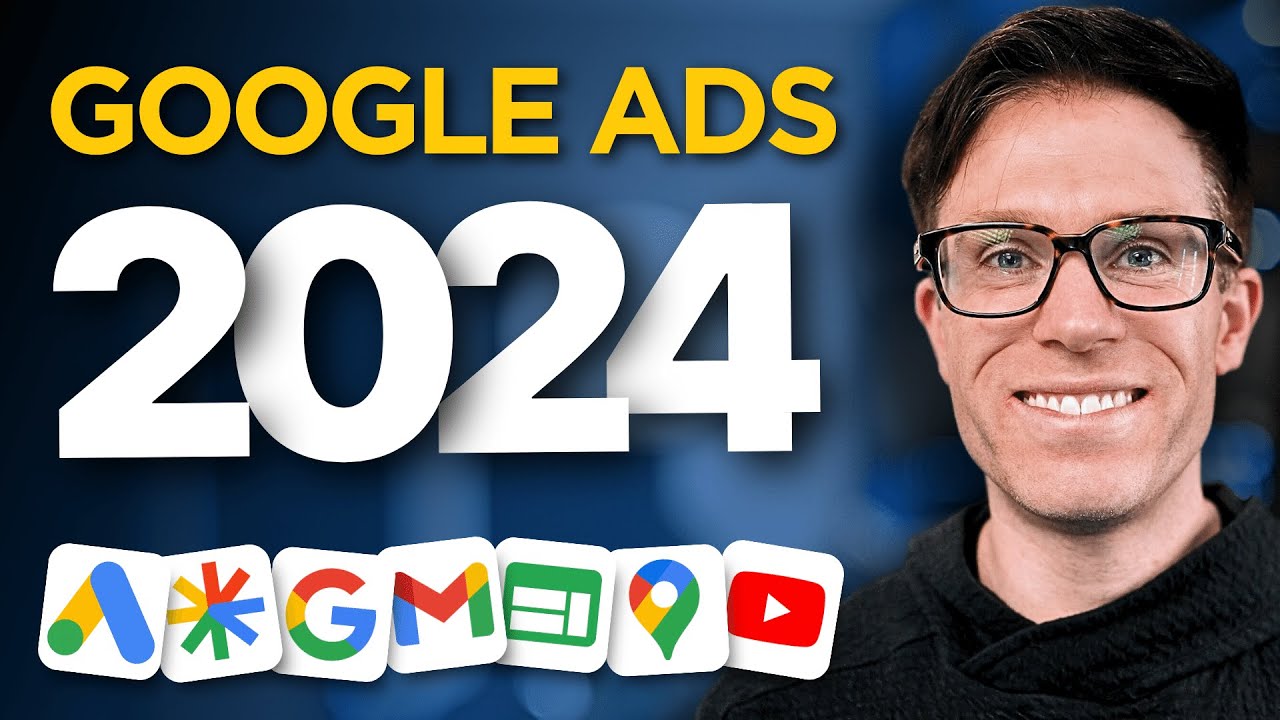How to Properly Structure A Google Ads Campaign in 2024 (Tutorial & Real Examples)
Summary
TLDRThis video tutorial guides viewers on optimizing Google Ads campaigns for better results by embracing the shift from search-based to intent-based advertising. It explains the importance of adapting to Google's AI-driven understanding of user intent, which allows ads to show for similar search terms. The video suggests structuring campaigns with single-intent ad groups, using dynamic keyword insertion for ad headlines, and recommends using phrase match over broad or exact match types. It also touches on the simplification of campaign management with fewer ad groups and the use of an optimization checklist for ongoing improvement.
Takeaways
- 🔍 Google Ads has shifted from search-based to intent-based targeting, allowing ads to show up for related search terms even if they don't match the exact keyword.
- 📈 The change to intent-based targeting means that ads can appear for different variations of a search term, which requires a restructure of ad campaigns to manage and compensate for varied search intent.
- 📝 It's crucial to adjust ad headlines to match the intent of the search terms to avoid dissonance and maintain a high click-through rate (CTR).
- 🛠️ The old method of single-keyword ad groups is no longer effective due to the new intent-based system, which necessitates a move towards broader ad group structures.
- 🔑 The concept of 'single intent ad groups' is introduced, where similar keywords are grouped together under one ad group to streamline campaign management.
- 🔄 Dynamic keyword insertion is recommended to create customizable headlines that can adapt to the triggering keyword, ensuring relevance and improving CTR.
- 📊 Using a tool like AdWords Wrapper can help manage keywords more efficiently by wrapping them in the desired match type, such as phrase match, for better control.
- 📈 Phrase match is suggested as a balanced match type that allows for flexibility while still maintaining relevance, unlike broad match which can be too broad.
- 📝 The script recommends creating multiple ads per ad group to allow Google to test and optimize the best performing ads, typically suggesting three ads per group.
- 📋 An optimization checklist is mentioned as a useful tool for managing and tracking the performance of Google Ads campaigns on a regular basis.
Q & A
What is the main focus of the video?
-The main focus of the video is to guide viewers on how to structure their Google Ads campaign for the best results, particularly emphasizing the shift from search-based to intent-based advertising.
What is the significance of the switch from search-based to intent-based in Google Ads?
-The switch to intent-based advertising in Google Ads allows ads to appear for related search terms that may not be an exact match, broadening the potential reach of ads and making it more adaptive to user intent.
Why is it important to adjust campaigns to manage different keyword variations?
-Adjusting campaigns to manage different keyword variations is important because Google's AI interprets many similar phrases as having the same intent, which can affect ad visibility and click-through rates if not properly optimized.
What is the recommended approach for structuring ad groups in the new intent-based system?
-The recommended approach is to use single intent ad groups, which involve grouping keywords that are semantically similar under one ad group, allowing for more efficient management and optimization.
How does dynamic keyword insertion help in creating ad headlines?
-Dynamic keyword insertion helps in creating ad headlines by automatically inserting the triggered keyword into the headline, making it more relevant to the user's search query and potentially increasing click-through rates.
What is the recommended number of ads per ad group?
-It is recommended to have three ads per ad group to allow Google to test and optimize effectively, providing enough data for A/B testing without overwhelming the advertiser.
Why is using phrase match considered better than broad match in many scenarios?
-Phrase match is considered better than broad match in many scenarios because it offers a balance between reach and relevance. It allows for some flexibility in search terms while still maintaining a connection to the intended keyword.
How can advertisers optimize their landing pages in the context of intent-based advertising?
-Advertisers can optimize their landing pages by ensuring that the content is relevant to the keywords and ad copy, even if not every single keyword needs to be represented. The focus should be on addressing the user's intent.
What is the benefit of reducing the number of ad groups from hundreds to just a few?
-Reducing the number of ad groups from hundreds to just a few simplifies campaign management, makes optimization easier, and allows for more efficient use of resources and quicker analysis of campaign performance.
What tool is recommended for managing keywords in Google Ads?
-The tool recommended for managing keywords in Google Ads is AdWords Wrapper, which can be accessed at adwordsrapper.com. It helps in wrapping keywords effectively for better campaign performance.
Outlines

This section is available to paid users only. Please upgrade to access this part.
Upgrade NowMindmap

This section is available to paid users only. Please upgrade to access this part.
Upgrade NowKeywords

This section is available to paid users only. Please upgrade to access this part.
Upgrade NowHighlights

This section is available to paid users only. Please upgrade to access this part.
Upgrade NowTranscripts

This section is available to paid users only. Please upgrade to access this part.
Upgrade NowBrowse More Related Video

Tutorial Search Engine Marketing (SEM) - Google Adwords 2021

How GOOGLE ADS Works in 2024

How to Rank Your Website on Google - WordPress SEO For Beginners

Keyword Intent For Local Businesses - Change The Intent & Get Hundreds Of Leads

Week 8 Full Class

Why Google Ads CPCs Keep Increasing And How to Fix It
5.0 / 5 (0 votes)